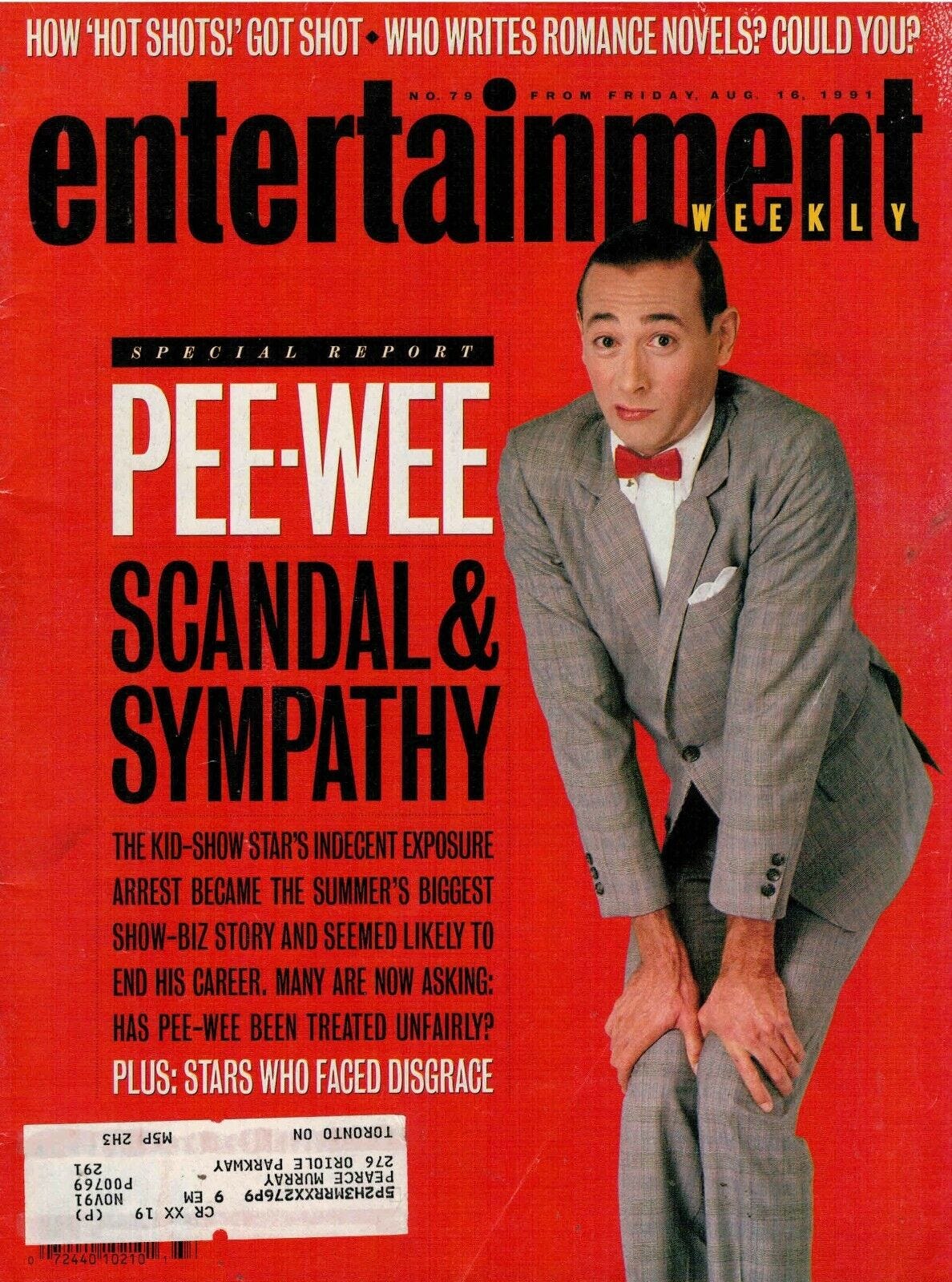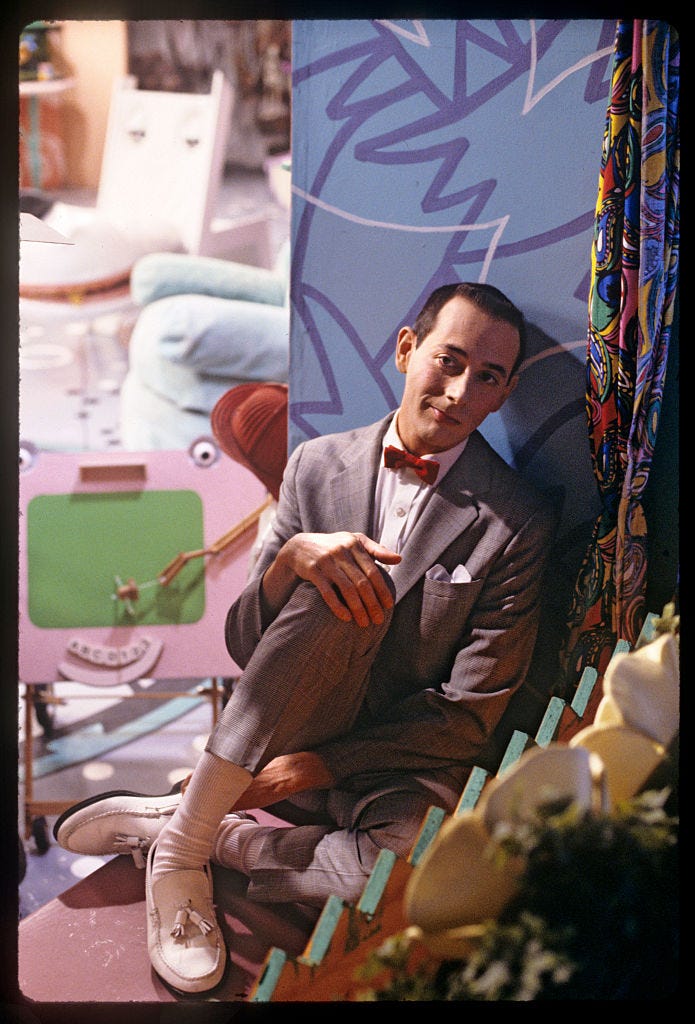The news that Paul Reubens has passed away at 70, after a private six-year battle with cancer, is hitting me on an oddly personal level. I was working at Home Box Office as a researcher when the very first Pee-wee Herman special was aired in 1981, introducing the Pee-wee character – a kind of lightly ironized and slightly Dada Pinky Lee – to an audience beyond the L.A. live comedy circuit. As I’ve written previously, his feature-film debut, 1985’s “Pee-wee’s Big Adventure,” was the litmus test for a woman I was seeing in the mid-1980s – if she didn’t find the movie funny, I wasn’t sure we could get married. (Lucky for me she did and we did.) And in July 1991, not long after I’d been hired at Entertainment Weekly, I sat in a morning editorial meeting defending Reubens after he’d been arrested for the victimless crime of visiting a porn theater during his non-Peewee downtime. If it was such a career wrecker, I asked, why was almost all of the coverage I was seeing sympathetic to the accused? “That sounds like a good cover story,” barked managing editor Jim Seymour – “Do you want to write it?” It wasn’t a request.
The Scandal, of course, came after five years of “Pee-wee’s Playhouse” on CBS. It wasn’t the first Saturday morning kids’ show to have a sidewise appeal to adults – “Rocky and Bullwinkle” and arguably Soupy Sales got there first – but it was the most radically imaginative, and by radical I include the show’s implicit social and political dimensions, created as “Playhouse” was by a gay performer stuffed knowingly into the suit of a goofy, asexual child-man, featuring a hella diverse cast (including Laurence Fishburne as Cowboy Curtis and S. Epatha Merkerson as Reba the Mail Lady), and with sets by the hippest of downtown graphic artists. “We put art history all over the show,” said illustrator/designer Gary Panter, who won three of 16 “Playhouse” Emmys for his art direction. (Props, too, to the late Phil Hartman, a fellow L.A. Groundlings veteran who helped write the scripts and played Captain Carl.) “Pee-wee’s Playhouse” mixed backward-looking nostalgia for “Howdy Doody” and “Captain Kangaroo” (whose creator Bob Keeshan loved the show) with forward-looking inclusivity and pure present-tense silliness, the kind that make kids feel smart and adults feel like kids. I still can recite Jambi the Genie’s magic chant, can you?
Still, it’s “Pee-wee’s Big Adventure” that’s the keeper – a movie that was weirdly timeless when it came out, existing somewhere between the world of “Our Gang” and “SNL,” and which manages the impossible trick of being simultaneously arch and innocent. A lot of that is due to Tim Burton, coming out of the gate strong with his feature directing debut and striking exactly the right tone of grown-up childlike delight. Much is due as well to the other cast members: Diane Salinger as waitress Simone (“Let’s talk about your big But”), Mark Holton as Francis (“Where are they hosing him down??”), Elizabeth Daily (“I’m a loner, Dottie, a rebel”), the late Jan Hooks (“Can you say adobe?”) and Alice Nunn, whose transfiguration as Large Marge my children played and replayed on endless VHS repeat, shrieking in happy terror each time.
But it’s Reubens as Pee-wee who walks the film’s line between sincerity and farce, between making fun of and having fun with, and for some that line was so invisible as to not exist. New York Times film critic Vincent Canby famously gave “Pee-wee’s Big Adventure” one of the most withering pans of his career, ending his review with the words “You have been warned.” The Hollywood Reporter, by contrast, put it immediately into the pantheon, a fact celebrated by Reubens in his next appearance on “Late Night with David Letterman.” (The full clip, by the way, collects all of Pee-wee’s “Letterman” stints from 1982 to 1985 and is a compressed time capsule of his appeal – or, if you side with Canby, a warning.)
“Pee-wee’s Big Adventure” is in my pantheon, too – it’s one of the most creatively otherworldly movies to ever come out of the American movie factory, inhabiting a playfully plastic universe not far from those of Jacques Tati, Jerry Lewis, Frank Tashlin, and other visionaries for whom the movies aren’t a machine to capture the reality that exists but a canvas to create an entirely new one. That the movie is Tim Burton’s triumph, too, can be gauged by the lackluster follow-up, “Big Top Pee-wee” (1989), directed by Randal Kleiser (“Grease”) and by the failure, really, of any other Pee-wee iteration besides “Playhouse” to fully inhabit its prime mover’s gently subversive mindset. Was Paul Reubens trapped by the character he’d created? When he appeared in small featured roles in movies or on TV – as the Penguin’s father in “Batman Returns” (1992) or an idiot Hapsburg prince on “30 Rock” — there was always the slightly surreal jolt of seeing Pee-wee Herman playing someone else. But I also like to think that he understood what he had birthed: A character that joins Mickey Mouse and Sherlock Holmes and the Little Tramp and Shirley Temple as shared pop culture creations that don’t really need to have lived – although some did – to be eternally alive. Paul Reubens will rest in peace and in a generation’s memory. Pee-wee Herman will bicycle into the sunset forever.
What are your memories of this unique performer? Feel free to offer your thoughts; comments are open to all.
If you enjoyed this edition of Ty Burr’s Watch List, feel free to pass it along to others.
If you’re not a paying subscriber and would like to sign up for additional postings and to join the discussions — or just help underwrite this enterprise, for which the author would be eternally grateful — here’s how.
You can give a paid Watch List gift subscription to your movie-mad friends —
Or refer friends to the Watch List and get credit for new subscribers. When you use the referral link below, or the “Share” button on any post, you'll:
Get a 1 month comp for 3 referrals
Get a 3 month comp for 5 referrals
Get a 6 month comp for 25 referrals. Simply send the link in a text, email, or share it on social media with friends.
There’s a leaderboard where you can track your shares. To learn more, check out Substack’s FAQ.






